Dudzik et al. The Joint Commission Journal on Quality and Patient Safety 2019;000:1-9
Importance of Conclusion
Over a 1-year period, the RQI provider course improved learner performance of compression and ventilation skills with an increase in performance scores, a decrease in the number of attempts to pass ventilation and an increase in CPR skills confidence.
Key Points
- Providers demonstrated an increase of compression scores from a median score of 84% in Q1 to 89% in Q4.
- For ventilation scores, providers decreased their number of attempts to pass from Q1 to Q4 with the number of attempts decreasing from 2 to 1.
- Over half of participants (67.4%) agreed or strongly agreed that RQI was their preferred method of BLS training versus the traditional 2-year model.
- 81.8% of participants provided feedback on what they like about the RQI program, including ands-on practice, real-time feedback, repetition and self-directed learning.
- Pre- and post-RQI learning, participants responded with an increase in confidence of being able to perform basic life support.
Read the article
